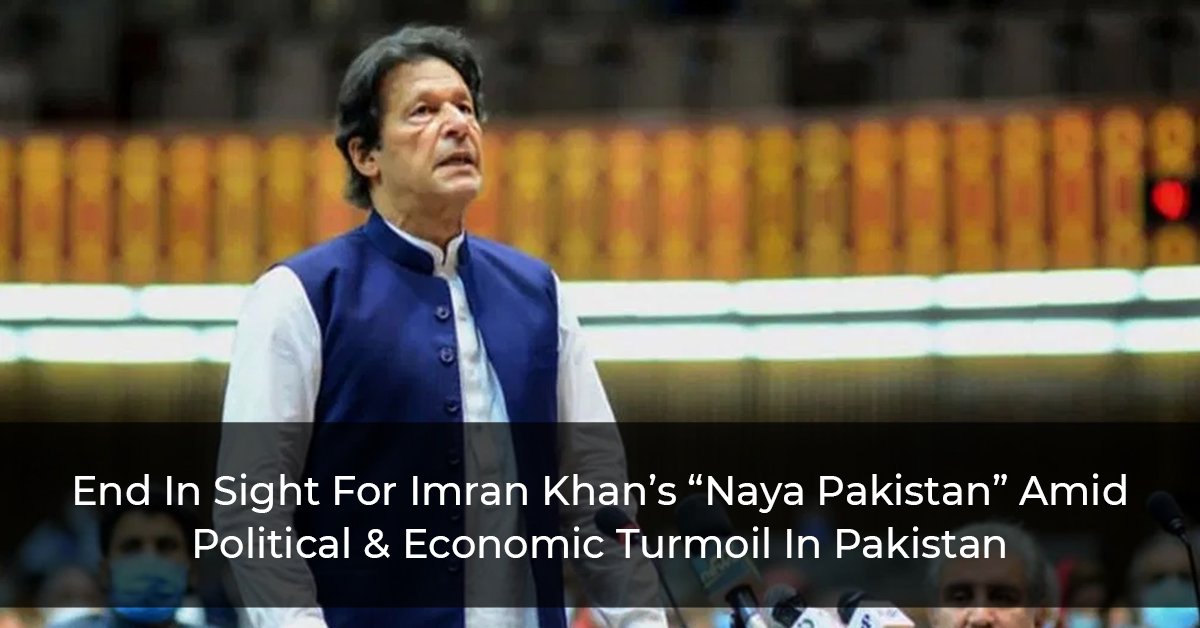Highlights:
- According to Imad Zafar, a political analyst, the PM Imran Khan is having difficulty steering the country out of its political and economic turmoil
- The country’s rising inflation and poverty levels are making his Naya Pakistan (New Pakistan) project a nightmare for the people, wrote Imad Zafar
- This comes after Pakistan’s foreign debt increased by USD 3 billion, or 2.6 percent, according to data released by the central bank in February
With Pakistan’s political instability escalating with each passing day, Prime Minister Imran Khan’s ‘Naya Pakistan’ seems to be dooming, owing to the country’s rising inflation.
The Prime Minister is having difficulty steering the country out of its political and economic turmoil, according to Imad Zafar, a political analyst for various media outlets and think tanks.
The National Assembly (NA) gave Khan a vote of confidence. After his party was humiliated in the Senate by the Pakistan Democratic Movement (PDM), a coalition of opposition parties, Khan required the vote to affirm his majority in the lower house of parliament.
Not only did the PDM succeed in electing ex-prime minister Yousaf Raza Gillani to the Senate, defeating incumbent finance minister Hafeez Shaikh, but it also won a majority in the upper house, according to Zafar.
Zafar wrote an article for The Asia Times which said, “Khan may have averted the crisis for the time being by receiving a vote of confidence from the NA, but the storm is not over for him. Inflation and poverty levels are increasing in Pakistan, making his Naya Pakistan (New Pakistan) project a nightmare for the people.”
“Even the military establishment is unable to run the country from behind the scenes due to the current state of affairs,” he said.
Also Read: India Slams UK Lawmakers’ Farm Row Debate And “Safety Of Farmers”
The elite’s frustration was evident, he said, on the day of the confidence vote, when parliamentarians from the Pakistan Muslim League-Nawaz (PML-N) were assaulted by a mob of supporters of the ruling Pakistan Tehreek-e-Insaf (PTI).
“Imran Khan is doing everything he can to keep his grip on power. The question is how he will survive the opposition’s onslaught at a time when the establishment is about to abandon him in favour of a new puppet to rule the country on its behalf,” the commentator wrote.
He continued, “Khan’s game is almost over, as he still has a few generals on his side, but he no longer has the unwavering support of the establishment that he had after his re-entry into politics in 2011. So, he’s definitely aware that this is his first and last chance to wield power, and he’s doing whatever he can to keep it.”
According to Zafar, the question is how long a few generals will be able to save him from the inevitable, as the public’s frustration over inflation, unemployment, and economic turmoil is increasing with time.
He mentioned that this is “perhaps the first time” that the military establishment’s strategy of indirectly ruling the country has backfired, and that it has happened in just two and a half years.
“Despite the fact that the majority of the mass media supported the hybrid regime, the opposition was able to create counter-narratives through foreign media and digital news channels, and Khan’s and his backers’ inability to manage the economy and governance doomed the Naya Pakistan project,” he said.
“The endgame has begun,” Zafar continued, “and the interesting thing is that Khan will not be able to remove the government until both Sharif and Zardari agree to depose him.”
This comes as Pakistan’s financial debt continues to rise, thanks to USD 6.7 billion in gross foreign loans earned by the Imran Khan government in the first seven months of the existing fiscal year, including a new commercial loan from China last month worth USD 500 million.
According to The Expresss Tribune, the Ministry of Economic Affairs announced that the government received USD 6.7 billion in foreign loans from various financing sources during the July-January period of fiscal year 2020-21. The gross loans increased by 6%, or USD 380 million, compared to the same time the previous fiscal year.
Pakistan’s foreign debt and liabilities increased by USD 3 billion, or 2.6 percent, in the six months ending in December last year, according to data released by the central bank in February.


